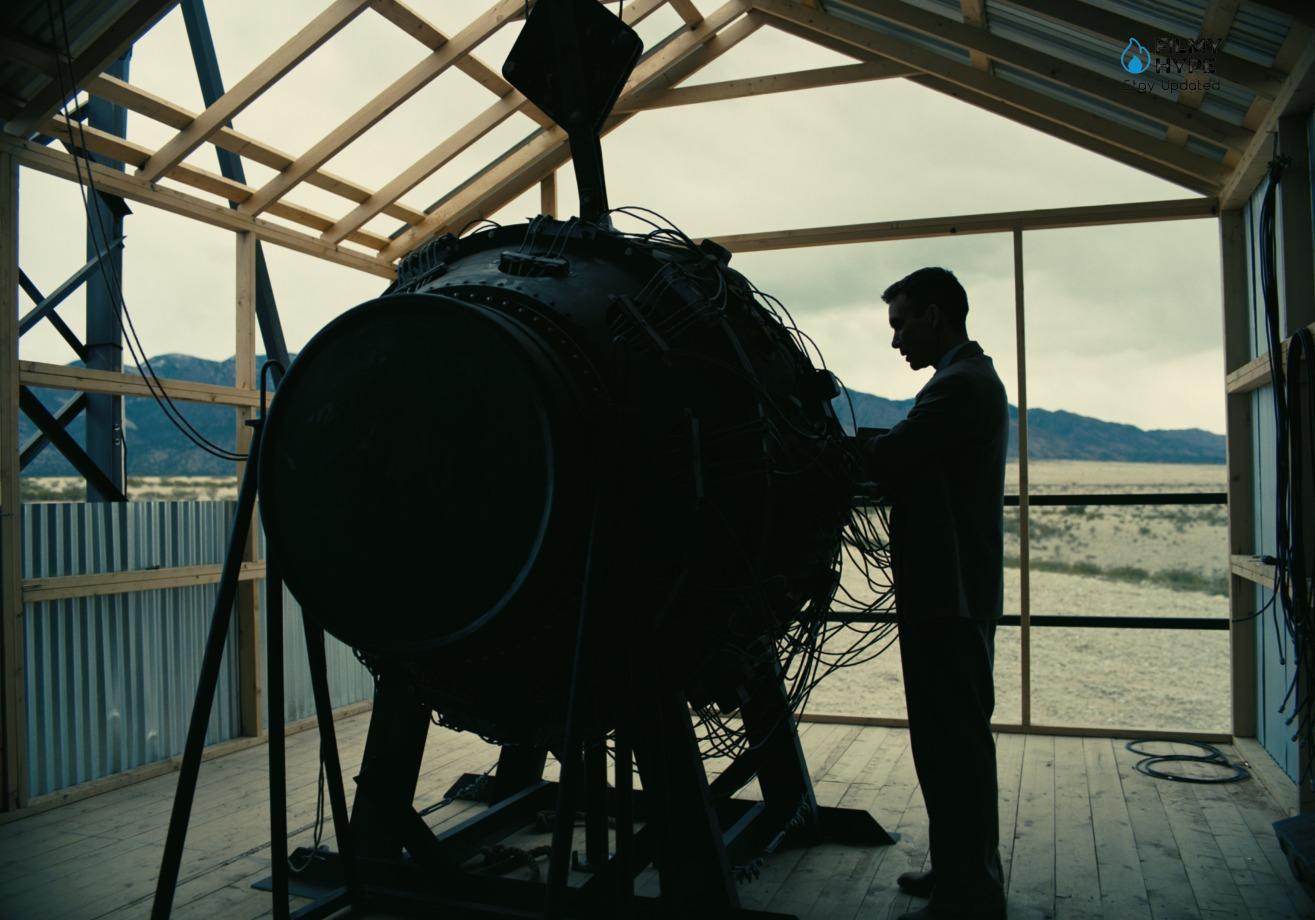Oppenheimer Review: The Triumph and Tragedy of The American Prometheus
Cast: Cillian Murphy, Emily Blunt, Matt Damon, Robert Downey Jr., Florence Pugh, Rami Malek, Benny Safdie, Josh Hartnett, Dane DeHaan, Jack Quaid, Matthew Modine, Dylan Arnold, Olli Haaskivi, Alden Ehrenreich, David Krumholtz, Michael Angarano, Kenneth Branagh
Director: Christopher Nolan
Where to Watch: In Theaters
Filmyhype.com Ratings: 5/5 (five stars)
Finally, one of the most anticipated movie Oppenheimer directed by Christopher Nolan released in theaters worldwide today. World War II was one of the most heartbreaking moments in human history. The war conflict caused the death of millions of people and devastated many cities. On the other hand, it was also a moment of great scientific advance, which would establish the threats to the future of the planet. Oppenheimer is situated in this context, with the invention of one of the most lethal weapons humans have created. The title of this feature film corresponds to the name of the “father” of the atomic bomb: physicist J. Robert Oppenheimer, director of the Manhattan Project. Christopher Nolan returns to the big screen three years after the premiere of Tenet, one of his most controversial films due to the narrative structure it presented. The author tends to divide viewers, but he has always aroused the curiosity of the public and specialized critics, causing great admiration for those who accept his proposal. On this occasion, the filmmaker approaches a biographical film for the first time but is impregnated by his unmistakable style.

Time is an obsession. The time you don’t remember, the time you lost, the time that goes backward. Nolan’s cinema has always had needles in his compass. Now, however, the time is up. Now we are inside a countdown that leads straight to an inevitable horror. It’s no longer timed to play with the hours, to captivate the audience with plot prestige and labyrinthine architecture. Now Christopher Nolan has a guilty conscience to explore. An interstellar journey inside personal black holes where it hurts to peek. And so, to do it in the best possible way, it returns as rigorous and dry as in the days of Dunkirk. You need balance, feet on the ground, and dirty hands to tell Oppenheimer. It does so with an existential drama in which human horror manifests itself in so many ways. Not only in the glassy gaze of the inventor of the atomic bomb. In this Oppenheimer review, we will tell you about one of Nolan’s less complicated films, but not the least complex of this. On the contrary. A dense, painful, sometimes cruel film that peers into the abyss of humanity capable of anything. How to protect the present by destroying the future. Quite the opposite of Nolan, who with this film imbued with atrocious wonder moves away from his past and embraces a new and beautiful cinema.
Oppenheimer Review: The Story Plot
When, in 1979, the American historian Martin J. Sherwin, who specialized in the proliferation of atomic weapons, began to work on research on J. Robert Oppenheimer, scientific director of the Manhattan Project, there were already several publications of the most different natures on the beginning of the Atomic Age and on the physicist who led the race that resulted in the atomic bomb and which profoundly and irrevocably changed the world overnight. Sherwin himself, in 1975, had published a work on the US decision to bomb Japan at the end of World War II, so his decision to focus on Oppenheimer was a natural evolution. However, despite having interviewed more than a hundred people and having delved deeply into basically all available documents, from the most varied sources – including and especially the FBI -, the book did not see the light of day in the 1980s as planned and only really began to take shape in 1999, when he convinced biographer Kai Bird to join the effort, which made it possible to publish the detailed tome in 2005 after dozens and dozens of other works had been published about the same subject and the same historical figure.
So, what makes Oppenheimer: The Triumph and Tragedy of the American Prometheus so special a book that it won the Pulitzer Prize and was the main basis for a 2023 feature film written and directed by Christopher Nolan? From a wealthy family with German roots, J. Robert Oppenheimer was born in New York in 1904. The scientist is best known for his work on the development of the first atomic bomb, but before that, he was a theoretical physicist whose studies stood out in the field of electron and positron theory. One of his most outstanding investigations constitutes the modern theory on neutron stars and black holes.

The film places us through flashbacks in different periods of his life, Christopher Nolan uses Oppenheimer‘s appearance before those responsible for National Security to explain the central episode of the Manhattan Project, as well as the controversy of his public figure and his position against the creation of the hydrogen bomb. With the appearance of different testimonies in the appearance, we can observe a representation of the physicist’s most personal life, his relationship with the Communist Party that would always persecute him, and his love relationships. Nolan did not want to develop a biographical film to use, but he decided to dress it up as a thriller through the trial of the scientist. Get a three-hour footage with a vibrant rhythm, an absorbing and dazzling narration with which he reviews the scientific and personal facts that marked Oppenheimer‘s life, a journey of emotions that mixed with historical facts, presents a complete vision of his proposal.
Oppenheimer Review and Analysis
A few days ago, it emerged that Oppenheimer was shot in just under two months. An almost negligible time for the cinematic spectacle we have witnessed. This means only one thing: that Nolan had clear ideas. Just like Oppenheimer had everything in mind before giving shape to his creature. A preparation supported by a solid screenplay, without frills as in the past. Indeed, Oppenheimer is a film of writing, at times very theatrical, full of words, facts, names, and characters. And this can be difficult (and sometimes heavy), especially in the first hour. But that’s not all that makes it the least commercial and most authorial film of Nolan’s career. A director who is at times unrecognizable, because he finally puts behind him that icy rationality that has always marked his filmography to embrace a more visceral, dirty, at times even lyrical cinema.
And it is precisely in those moments in which Nolan ceases to be the usual Nolan that the film shakes, surprises, and rises to a great experience. It happens with at least three anthology sequences, in which Oppenheimer turns into a creepy psychological horror. He does it through imperious images that tower over you and sound that makes you shiver. Scenes are so powerful that you almost feel guilty about finding the horror you’re watching beautiful. Why not, Oppenheimer is not an easy or pleasant film to watch. But it is a courageous, free, proud film. Directed by a director finally out of his comfort zone.
Hallucinated looks, deep dark circles, waking nightmares. If Oppenheimer is the voice of the verb to scrutinize it is all thanks to the cryptic face of an extraordinary Cillian Murphy. Nolan always puts him in the center of the shot, he’s almost on top of him to try to understand him, to get inside, to reveal the mystery. He won’t succeed. No, because Nolan watches Oppenheimer from the right distance. Never too close to empathize, never too far to stop at condemnation. Thanks to Murphy’s sense of proportion, the inventor of the atomic bomb implodes in his wrenching sense of guilt but remains an indecipherable and elusive mystery. Disturbing precisely because it is inexplicable. Nolan bombards him with dilemmas (about love, being in the world, responsibility, and awareness), but the answers are not conceived. Around him orbit an unrecognizable, mellifluous Robert Downey Jr., an emblem of an America always in need of new enemies to feel truly united, and two sketchy women (a strong wife and a fragile lover) just to better outline the man.
Yes, Nolan isn’t a director capable of portraying women well, but this time it’s not a question of males and females. It’s a matter of humanity. A word we often associate with the best of us. That’s not the case. Because what hurts about Oppenheimer is that we are all in that glassy gaze of Robert Oppenheimer. We are the worst we are capable of. Oppenheimer is one of Christopher Nolan‘s biggest bets. The filmmaker makes a biopic tense and epic. A historical drama that shows a truthful adaptation, with a thriller structure and absorbing and dazzling storytelling. Not only is its soundtrack excellent, but the sound design is fantastic for each sequence. The sublime interpretation of Cillian Murphy increases in scale with the interventions of Emily Blunt and Robert Downey Jr. It is difficult to contain Oppenheimer in one definition, but it is undoubtedly the premiere of the year, a feature film that has to be enjoyed in theaters.
Oppenheimer, it is worth making it clear, is studied throughout his life and, from a shy young genius of a privileged life with diffuse interests, but who gravitates around science, especially chemistry, and physics, we see his fight against mental issues and his evolution and transformation into an eloquent, admired man, capable of teaching and lecturing like no one else and of capturing the potential of ideas to the point of serving as a springboard for the most diverse studies that led others – never himself – to win several Nobel Prizes in physics, everything flows relying on his almost unbelievable ability to manage not a mere group of scientists focused on creating a powerful weapon from the manipulation of the atom, but an entire city built from scratch in Los Alamos, New Mexico, with thousands of people living there full time.
However, as I said, this is the background that approaches a scientist full of nuances, a man undeniably genius, but also arrogant and proud and at the same time socially conscious and naive, a background that is carefully painted from the beginning by the way his thinking gravitates to the left of the political spectrum. Honestly, the reader will probably need a good deal of patience for the book to start paying dividends, but the choice of the author duo is necessary to carefully and in detail unravel the friendships, enmities, inspirations, lovers, political differences, changes of position and all the other aspects that inform Oppenheimer from a young age. Furthermore, it is necessary to keep in mind that the book is not about the Manhattan Project, although, of course, it is duly covered in the second third of the work, about Oppenheimer as a symbol of a shameful era for the USA both in his politics internal and external, without him being guilty of anything (unless we blame the inventor of the revolver for the way it is used).
If there is serenity and interest on the part of the reader, therefore, to absorb the various – and I emphasize the “several” – narrative deviations that the authors take to color the historical figures that gravitate around Oppenheimer, including his mentor Neils Bohr, who always defended the sharing of information about the bomb with the Soviets, his longtime friend Haakon Chevalier whose connections with the Communist Party brought many problems, his wife Kitty and his brother Frank, also with ties to communism and, of course, with Lewis Strauss, who would become his mortal enemy and executioner, the work will prove to be extremely rich and dense, with extreme care for the fluidity that only rarely suffers from close repetitions of subjects and explanations. And, quite frankly, without this vast constellation of characters.

By comparison, Oppenheimer: The Triumph and Tragedy of the American Prometheus is like J’Accuse! of Émile Zola applied to a circumstance in which the accused is a figure of such complexity that it is not easy to connect with him. After all, even with all the mitigating factors surrounding him – sometimes emptied by aggravating factors, I recognize – Oppenheimer is, ultimately, responsible for creating the great weapon of mass destruction that changed and continues to change world geopolitics, so to use the word “hero” to classify him is not easy, something that, incidentally, Bird and Sherwin never use, even though they look at the Father of the Atomic Bomb as a victim of an incredibly perverse and Kafkaesque system.
And, beyond all that, the book is also painfully current due to the mistaken absolute dichotomy between the left and the right in today’s world, something intensified, amplified, and facilitated by several modern factors, including social networks that prevent civilized discussions, with the sides entrenched and incapable of realizing how idiotic they are. It becomes disturbing when the authors, using Oppenheimer‘s own words, establish their humanitarian vision of the world before the Manhattan Project and their internalization of responsibility after the creation of the atomic bomb that, immediately, through Strauss’s filters, become full proof of communism and, therefore, betrayal of the USA by Oppenheimer, while even generals who worked alongside the scientist realize that, strange as the scientist was.
Oppenheimer: The Triumph and Tragedy of the American Prometheus is a work of inestimable value, a biography that is not content with patting the biographed person’s head and that uses their life not as an end in itself, but rather to discuss a frightening – but strangely fascinating – geopolitical context that is the norm even today. Whether J. Robert Oppenheimer is a hero or a villain, whether he got the end he deserved or was wronged, whether he deserves to be remembered or forgotten is up to each reader to decide when to turn the last page, but one thing is certain: his biography by Kai Bird and Martin J. Sherwin is essential reading.
Oppenheimer Review: The Last Words
Painful, excruciating, and almost uncomfortable to watch, Oppenheimer is a profound drama that reflects on the faults of man and of mankind. Nolan disengages from his past and gives us a cinematic experience, at times memorable. Oppenheimer is one of Christopher Nolan‘s biggest bets. The filmmaker makes a biopic tense and epic. A historical drama that shows a truthful adaptation, with a thriller structure and absorbing and dazzling storytelling. It is the premiere of the year, a feature film that must be enjoyed in movie theaters.







